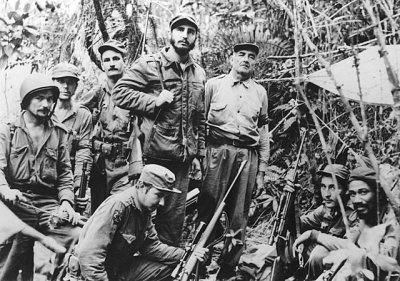Fulgencio Batista y Zaldvar (; Spanish: [fulxensjo atista i saldia]; born Rubn Zaldvar, January 16, 1901 August 6, 1973) was a Cuban military officer and politician who served as the elected president of Cuba from 1940 to 1944 and as its U.S.-backed military dictator from 1952 to 1959, when he was overthrown by the Cuban Revolution.
Batista initially rose to power as part of the 1933 Revolt of the Sergeants, which overthrew the provisional government of Carlos Manuel de Cspedes y Quesada. Batista then appointed himself chief of the armed forces, with the rank of colonel, and effectively controlled the five-member "pentarchy" that functioned as the collective head of state. He maintained control through a string of puppet presidents until 1940, when he was elected president on a populist platform. He then instated the 1940 Constitution of Cuba and served until 1944. After finishing his term, Batista moved to Florida, returning to Cuba to run for president in 1952. Facing certain electoral defeat, he led a military coup against President Carlos Pro Socarrs that pre-empted the election.Back in power and receiving financial, military and logistical support from the United States government, Batista suspended the 1940 Constitution and revoked most political liberties, including the right to strike. He then aligned with the wealthiest landowners who owned the largest sugar plantations, and presided over a burgeoning economy that diminished the gap between rich and poor Cubans. Eventually it reached the point where most of the sugar industry was in U.S. hands, and foreigners owned 70% of the arable land. As such, Batista's repressive government then began to systematically profit from the exploitation of Cuba's commercial interests, by negotiating lucrative relationships both with the American Mafia, who controlled the drug, gambling, and prostitution businesses in Havana, and with large U.S.-based multinational companies who were awarded lucrative contracts. To quell the growing discontent amongst the populacewhich was subsequently displayed through frequent student riots and demonstrationsBatista established tighter censorship of the media, while also utilizing his Bureau for the Repression of Communist Activities secret police to carry out wide-scale violence, torture and public executions. These murders mounted in 1957, as socialist ideas became more influential. Many people were killed, with estimates ranging from hundreds to about 20,000 people killed.These tactics ultimately failed to quell unrest and instead were the catalyst for more widespread resistance. For two years (December 1956 December 1958) Fidel Castro's 26th of July Movement and other rebelling elements led an urban- and rural-based guerrilla uprising against Batista's government, which culminated in his eventual defeat by rebels under the command of Che Guevara at the Battle of Santa Clara on New Year's Day 1959. Batista immediately fled the island with an amassed personal fortune to the Dominican Republic, where strongman and previous military ally Rafael Trujillo held power. Batista eventually found political asylum in Oliveira Salazar's Portugal, where he first lived on the island of Madeira and then in Estoril. He was involved in business activities in Spain and was staying there in Guadalmina at the time of his death from a heart attack on August 6, 1973.
The Cuban Revolution (Spanish: Revolución cubana) was an armed revolt conducted by Fidel Castro and his fellow revolutionaries of the 26th of July Movement and its allies against the military dictatorship of Cuban President Fulgencio Batista. The revolution began in July 1953, and continued sporadically until the rebels finally ousted Batista on 31 December 1958, replacing his government. 26 July 1953 is celebrated in Cuba as Día de la Revolución (from Spanish: "Day of the Revolution"). The 26th of July Movement later reformed along Marxist–Leninist lines, becoming the Communist Party of Cuba in October 1965.The Cuban Revolution had powerful domestic and international repercussions. In particular, it transformed Cuba–United States relations, although efforts to improve diplomatic relations, such as the Cuban thaw, gained momentum during the 2010s. In the immediate aftermath of the revolution, Castro's government began a program of nationalization, centralization of the press and political consolidation that transformed Cuba's economy and civil society. The revolution also heralded an era of Cuban medical internationalism and Cuban intervention in foreign conflicts in Africa, Latin America, Southeast Asia, and the Middle East. Several rebellions occurred in the six years following 1959, mainly in the Escambray Mountains, which were defeated by the revolutionary government.

1957Sep, 5
Cuban Revolution: Fulgencio Batista bombs the revolt in Cienfuegos.
Choose Another Date
Events on 1957
- 9Jan
Suez Crisis
British Prime Minister Sir Anthony Eden resigns from office following his failure to retake the Suez Canal from Egyptian sovereignty. - 8Mar
Suez Crisis
Egypt re-opens the Suez Canal after the Suez Crisis. - 24Jun
First Amendment to the United States Constitution
In Roth v. United States, the U.S. Supreme Court rules that obscenity is not protected by the First Amendment. - 6Jul
Paul McCartney
John Lennon and Paul McCartney meet for the first time, as teenagers at Woolton Fete, three years before forming the Beatles. - 24Sep
101st Airborne Division
President Dwight D. Eisenhower sends 101st Airborne Division troops to Little Rock, Arkansas, to enforce desegregation.

 English
English  español
español  français
français  português
português  русский
русский  العربية
العربية  简体中文
简体中文 